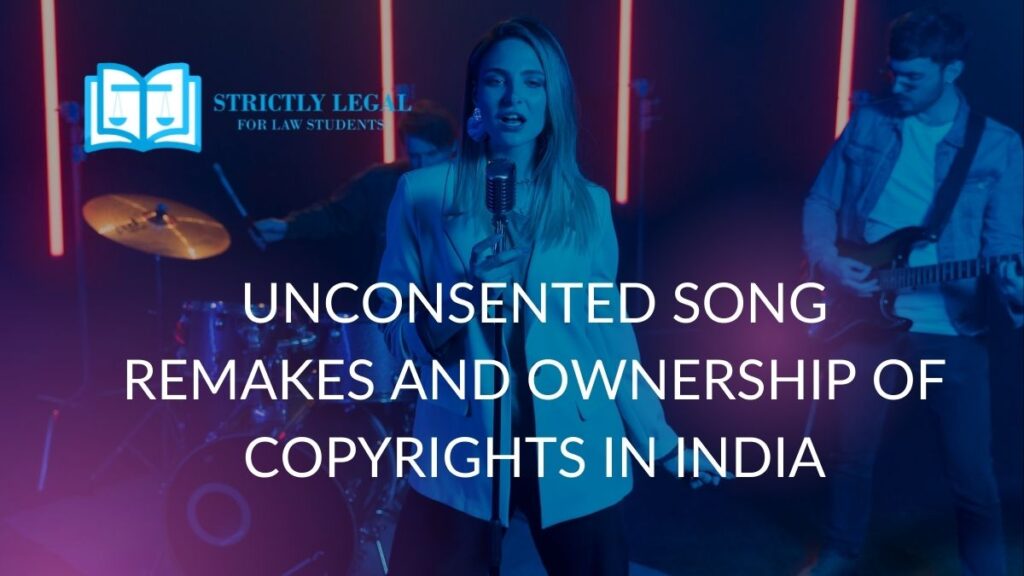The issue of copyrights triumphs since what we can call a forever. Nonetheless, there was no legislation or statutes for the same unless 1914. After the said period, certain mitigation was made to the legislation, for example, incorporation of criminal punishment in cases of violation of copyrights and broadening the aim, hope, and scope of “Copyright” as the owner or the author of the original work has the right to change, reproduce, produce or publish a relocation of work and the same legislation was then called as The Copyright Act, 1957, which regulates every copyright laws in India.
Later, with time, the aforementioned act was passed by the Parliament as the Copyright (Amendment) Bill,2012 which focused light on bringing the Laws of Indian Copyrights all around the world. In compliance with the World Intellectual Property Organization (WIPO), the below-mentioned amends were made to the 2012 amendment.
- Amendments with regards to WIPO Copyright Treaty and WIPO Performance and Programme Treaty.
- Amendments in the mode of accordance with license and assignments.
- Shields against piracy of the internet.
Table of Contents
FIELDS WHERE COPYRIGHT LAW IS IMPOSED
There can be various fields where copyright laws are imposed but this paper focuses on a few.
Copyright in Literary Works
This area of field covers newspapers, magazines, novels (fictional and nonfictional both), computers, software, etc are called to be literary works that are copyrighted. Owners of the same are known as authors or creators. For example, when someone writes a novel or a research paper and publishes it, they have the copyright of that particular novel or research paper respectively.
Copyright in Dramatics
This area of the field includes dancers, screenplays, dramas, etc. For example, if someone has their self-created special dance steps and uploads the same over any social platform, he or she has the copyright of that dance step and is protected under the Act.
Copyright in Sound Recordings
Several sound recordings make a song, may it be with the music or without. In present days there are various sound recordings we come across in everyday life I.e., podcasts, audios, speeches, conversations, etc which also fall under the ambit of the act. The creators of the same are known as producers. For example, the podcasts, songs, speeches, etc we hear and find on Wynk Music or Spotify are all copyrighted.
Copyright in Music Industry
Musical works make music that combines graphical notations and symbols. The author of the same is known as a composer. Listening here today, we have often come across various remixes, as we call it as to is being made by renowned composers of Bollywood.
One such example was the song Masakali composed by A.R. Rahman in 2009. He was the original composer of the song. The same song was renamed Masakali 2.0 and was sung by Tanishk Bagchi in the year 2020. Here, neither the producer of the song nor the singer seek any permission from its original composer back in 2009. The first song was nonetheless copyright protected but no actions were being taken for the later one, for the lackadaisical enforcement in India. Not only this only song, but due to a serious lack of enforcement, many rich and powerful producers get away with copying an original piece of work by adding new beats and modern musical instruments. The details of a composer are specified u/s 17 of the Act as
“the composer, is the author of a musical work, is the first owner of copyright in it, unless certain conditions exist. As per provision (c) to the section, if a work is made in the course of employment under a contract of service and there is no agreement to the contrary, it is the employer who would be the first owner and not the author.”
There is a list of songs that were being remade from original pieces of work without any permission from their original composers or producers.
Remixing of Songs a Criminal Activity?
The word “remix” has never been defined in the Act. However, in any remix, the former song is always changed, even if it is for a bit. Either the change of singers, the addition of new words or musical beats, or the omission of words. Remixes can nonetheless be a wonderful piece of art if only the original meaning and motto of the prior song aren’t changed. Though, it needs equal protection.
In Gramophone Co. V. Super Cassettes, an audio clip cassette named “Ganapati Arti Ashtavinayak Geete” was to be recorded. With regards to making a sound recording, the respondents approached the petitioners with an offer for paying a license fee. Nonetheless, the petitioner didn’t consent the respondents to go forward with the usage of the audio recording. Eventually, without the consent of the petitioners, the respondent went on with the usage of the audio recording in their cassette. Hence, it was held by the Honorable Court that the consent of the petitioner here was imperative for using the recording u/s 52(1) of the Act. More importantly, it is decisive that the person making the sound recording must compulsorily provide notice of his or her intention to make the sound recording to the owner of the original track.

Law student.
Turning legal insights into engaging narratives.





